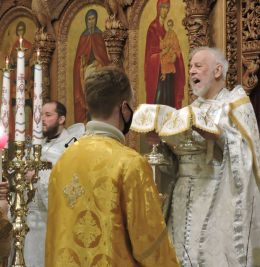Services
 The services of the Church are not laid upon us as burdens. Prayer and worship is a great privilege given to us by God Himself. We are permitted to stand in His presence and to seek after Him in prayer.
The services of the Church are not laid upon us as burdens. Prayer and worship is a great privilege given to us by God Himself. We are permitted to stand in His presence and to seek after Him in prayer.
Saturday: Vespers 6:00pm
Sunday: Hours 9:30am, Liturgy 10:00am
Languages of Service: English, Slavonic, occasional French and Greek
Calendar: Old Style
Patronal Feast: July 28 (July 15 old calendar)
Holy Communion
Holy Communion is open to Orthodox Christians who are properly prepared to receive by Fasting, Prayer and Confession and are present in the church by the time of the opening blessing (“Blessed is the Kingdom...”).
Confessions
Confession is an integral part of the Christian life/worship experience. In the Orthodox tradition, it should practices regularly in conjunction with attendance at Vespers and Liturgy and reception of the sacrament. The best way to approach confession is to prepare oneself carefully before coming to the church, and be concise and clear during confession so that everything may proceed easily and smoothly. Time is somewhat limited, and there may be a fairly large number of people wanting/needing confession. Please be considerate of others in this regard.
Confessions take place during the Liturgy; also by appointment with Fr David.
Submitting Names
There is the custom of submitting names to be remembered during the Prothesis (or Proskimidia) at the beginning of the Divine Liturgy. This practice is normally reserved for the commemoration of living or departed Orthodox believers, or family members or very close friends. Think carefully of who may need special prayer at that particular time, and submit only those names. They must be submitted during the Prothesis while the priest is still in the process of preparing the diskos.
Panikhidas
Panikhidas (prayers for the departed) and other prayers of blessings are performed on Saturdays (before or after Vespers) or at other prearranged times. Requests for such services must be made at least twenty-four hours in advance. Normally a Panikhida is served for one or two very specific departed persons. The general rule is that the Panikhida is reserved only for departed Orthodox Christians, although in the case of family members or very close friends, this rule is often overlooked.
